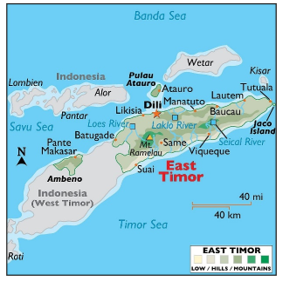SYLLABUS
GS-2: Bilateral, regional and global groupings and agreements involving India and/or affecting India’s interests.
Context: Timor-Leste was formally admitted as the 11th member of the Association of Southeast Asian Nations (ASEAN) during the 47th ASEAN Summit held in Kuala Lumpur, Malaysia under the theme “Inclusivity and Sustainability”.
More on the News
- Timor-Leste’s Prime Minister signed the Declaration of Accession during the opening of the 47th ASEAN Summit, marking the formal inclusion of Asia’s youngest nation in ASEAN and bloc’s first expansion since 1999..
- ASEAN membership will open new avenues for trade, investment, and regional cooperation, offering opportunities for economic diversification beyond oil and gas resources.
About East Timor
- East Timor, also known as Timor-Leste, is located in Southeast Asia on the eastern half of Timor Island, north of Australia and south of Indonesia’s Maluku Islands.
- The country applied for ASEAN membership in 2011, was granted observer status in 2022, and achieved full membership in 2025.
- With a population of 1.4 million and about 42% living below the poverty line, the nation aims to use ASEAN integration to promote youth employment and sustainable development.
- Analysts note that while ASEAN membership offers major benefits, it also requires Timor-Leste to align with the bloc’s principle of non-interference, particularly on sensitive issues like Myanmar.

The Association of Southeast Asian Nations (ASEAN)
- It was established in 1967 after the signing of the ASEAN Declaration (Bangkok Declaration) by the founding members ASEAN Indonesia, Malaysia, Philippines, Singapore and Thailand.
- Current members of ASEAN (11): Brunei, Cambodia, Indonesia, Laos, Malaysia, Myanmar, the Philippines, Singapore, Thailand, Vietnam and Timor-Leste
- The ASEAN Secretariat is located in Jakarta, Indonesia.
- The ASEAN Summit, held biannual (twice in a year) is the highest policy-making body in ASEAN comprising the Heads of States or Government of ASEAN Member States.
- The organisation operates on key principles of sovereign equality, non-interference in internal affairs, and consensus-based decision-making.
- ASEAN’s collective population exceeds 680 million, with a combined GDP of about $3.8 trillion, making it one of the world’s most dynamic regional groupings.
- Its economic framework includes initiatives like the ASEAN Economic Community (AEC) and trade agreements such as the Regional Comprehensive Economic Partnership (RCEP).
- ASEAN engages with global partners such as the United States, China, India, Japan, and the European Union through dialogue mechanisms and summits.

